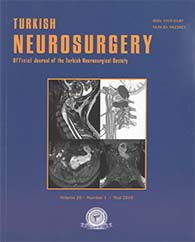3Gülhane Military Medical Academy, Department of Neurosurgery, Ankara, Turkey AIM: This study was planned for detailed evaluation of electrophysiological findings in patients with adult TCS.
MATERIAL and METHODS: Patients were retrospectively assessed for clinical, radiological and electrophysiological data between 1999 and 2008. Tibial somatosensorial evoked potentials, needle electromyography, nerve conduction studies and late responses (H reflex and F response) were studied in thirty (1 female, 29 males) TCS patients diagnosed by lumbar magnetic resonance imaging.
RESULTS: Tibial somato-sensorial evoked potentials cortical response latency was abnormal in 18 (60%) patients. Needle electromyography revealed chronic neurogenic involvement in 13 (43.3%) patients. In nerve conduction studies, motor unit action potential amplitudes were reduced in 5 (16.6%) patients and H reflexes were abnormal in 13 (43.3%) patients.
CONCLUSION: Different electrophysiological abnormalities may be seen in patients with adult TCS. Our results indicated that tibial SEP abnormalities are most sensitive electrophysiological finding in patients with adult TCS. Patients with TCS should undergo electrophysiological examinations whether they have subjective or objective complaints. These examinations should evaluate different systems and treatment planning should be done with the data obtained.
Keywords : Tethered cord syndrome, Somato-sensorial evoked potentials, Needle electromyography, Nerve conduction study, Late responses, Electrophysiology




